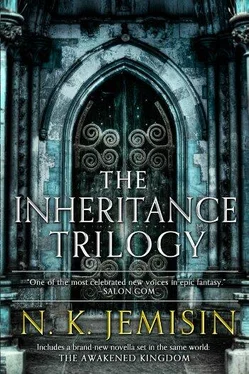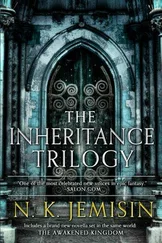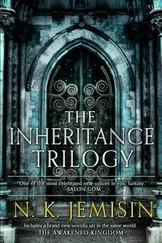“True,” said Remath. “Well, then. I expect you have demands?”
“Simple ones, Arameri.” Family name only was the way Darre addressed formidable opponents, a mark of respect by her terms. To Amn, of course, it was blatant disrespect. “I—and my allies, who would be here if it had not taken all our dimmers and magicians to get even one person through your barriers—demand that your family give up its power and all trappings thereof. Your treasury: fifty percent of it is to be given to the Nobles’ Consortium, to be distributed equally among the nations of the world. Thirty percent will go to the Order of Itempas and all established faiths that offer public services. You may retain twenty percent. You may no longer address the Nobles’ Consortium. It is for them to say whether Sky-in-Shadow can retain its representative. Disband your army and distribute its generals among the kingdoms; relinquish your scriveners and spies and assassins and all your other little toys.” Her eyes flicked toward the Darre guards, full of contempt. I did not see whether the women reacted to this or not. “Send your son back to the Litaria; you don’t want him anyway.” (Nearby, Deka’s jaw flexed.) “Send your daughter to foster in some other kingdom for ten years so that she can learn the ways of some people other than you murderous, high-handed Amn. I will leave the choice of kingdom to you.” She smiled thinly. “But Darr would welcome her and treat her with such respect as she is capable of earning.”
“ Like hells will I live among those tree-swinging barbarians,” snapped Shahar, and the other highbloods murmured in angry agreement.
Usein went on. “In short, we demand that the Arameri become just another family and leave the world to rule itself.” She paused, looking around. “Oh. And leave this palace. Sky’s presence profanes the Lady’s Tree—and frankly, the rest of us are tired of looking up at you. You will henceforth dwell on the ground, where mortals belong.”
Remath waited a moment after Usein fell silent. “Is that all?”
“For now.”
“May I ask a question?”
Usein lifted an eyebrow. “You may.”
“Are you responsible for the murders of my family members?” Remath spoke lightly, but only a fool would not have heard the threat underneath. “ You in the plural, obviously.”
For the first time, Usein looked unhappy. “That was not our doing. Wars of assassination are not our way.” Left unspoken was that wars of assassination were very much the Amn way.
“Whose, then?”
“Kahl.” Usein smiled, but it was bleak. “Kahl Avenger, we call him—a godling. He has been of great help to us, me and my forbears and our allies, but it has since become clear that this served his own agenda. He merely used us. We have broken ways with him, but I’m afraid the damage is done.” She paused, her jaw tightening briefly. “He has killed my husband and numerous members of our Warriors’ Council. Perhaps that will seem a consolation to you.”
Remath shook her head. “Murder is never a thing to be celebrated.”
“Indeed.” Usein regarded Remath for a long moment, then bowed to her. It was not a deep bow, but the respect in the gesture was plain. An apology, unspoken. “Kahl has been declared an enemy by the peoples of the north. But that does not negate our quarrel with you.”
“Naturally.” Remath paused, then inclined her head, a show of great respect in Amn terms, since the ruler of the Amn had no need to bow to anyone. By Darre standards, it was probably an insult.
“Thank you for your honesty,” Remath added. “Now, as to the rest, your demands regarding my family: no.”
Usein raised her eyebrows. “That’s all? ‘No’?”
“Were you expecting anything else?” I could not see Remath’s face well, but I guessed that she smiled.
Usein did, too. “Not really, no. But I must warn you, Arameri: I speak for the people of this world. Not all of them would agree with me, I will admit, as they have spent too many centuries under your family’s control. You have all but crushed the spirit of mortalkind. It is for their sake that I and my allies will now fight to revive it—and we will not be merciful.”
“Are you certain that’s what you want?” Remath sat back, crossing her legs. “The spirit of mortalkind is contentious, Usein-ennu. Violent, selfish. Without a strong hand to guide it, this world will not know peace again for many, many centuries. Perhaps ever.”
Usein nodded, slowly. “Peace is meaningless without freedom.”
“I doubt the children who starved to death, before the Bright, would agree.”
Usein smiled again. “And I doubt the races and heretics your family have destroyed would consider the Bright peace .” She made a small gesture of negation with her hand. “Enough. I have your answer, and you will soon have mine.” She lifted a small stone that bore a familiar mark. A gate sigil. She closed her eyes, and a flicker later she was gone.
The lower image—of Shadow and the silent maskers—jolted abruptly, drawing our eyes. There was a brief blur of motion, which grew still as the soldier who held the sphere set it down. We saw him then, a young man in heavy armor marked with seven sigils: one on each limb, one on his helmet, one on his torso, and one on his back. Simple magic of protection. He held a pike at the ready, as did the other men—all in the same armor—that we could see. Their armor was white. I suppose Remath hadn’t gotten around to reequipping her army to symbolize the family’s new divine allegiance.
And beyond them, the maskers had begun to move. Slowly, silently, they walked toward the soldiers that we could see. I could only assume that beyond the image, the scene was being repeated throughout Shadow. All of the masks that we could see, in every color, were tilted upward, paying no attention to the soldiers before them. Fixed on Sky.
“How does she command them?” Deka murmured, frowning as he peered at the image. “We were never able to determine…”
His musings were drowned out by noise from both images. Out of view, someone shouted to the soldiers, and the battle began as volleys of crossbow bolts shot toward the masked ranks. Already we could see that the bolts did almost nothing. The maskers continued forward with arrows jutting from chests, legs, abdomens. A handful went down as their masks were split or cracked, but not enough. Not nearly enough.
In the higher image, Remath barked orders to the soldiers in her audience chamber. We saw hurried movement, chaos. Amid this, however, Remath rose from her throne and turned to face it. She leaned forward and touched something we could not see. “Shahar.”
Shahar started, coming forward. “Mother? You must come here, of course. We are ready to accommodate—”
“No.” Her quiet negative struck Shahar silent, but Remath smiled. She was calmer than I had ever seen her. “I have had dreams,” she said, speaking softly. “I’ve always had them, for whatever reason, and they have always, always, come true. I have dreamt this day.”
I frowned in confusion. Dreams that came true? Was that even possible for mortals? Remath was a godling’s granddaughter…
In the image below her face, the maskers charged forward, running now. The sphere’s range was too small to capture more than a segment of chaos. For brief stretches there was nothing to see, interspersed with blurring glimpses of shouting men and still, inhuman faces. We barely noticed. Shahar stared at her mother, her face written with anguish as if there were no one else in the room, nothing else that she cared about. I put a hand on her shoulder because for a moment it looked as though she might climb onto the table to reach Remath. Her shoulder, beneath my hand, was taut and trembling with suppressed tension.
Читать дальше












